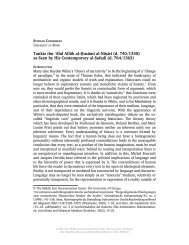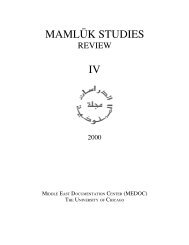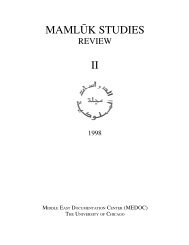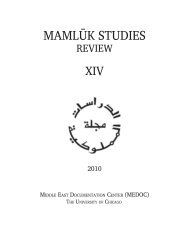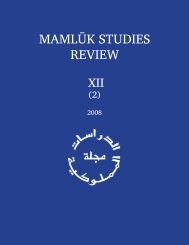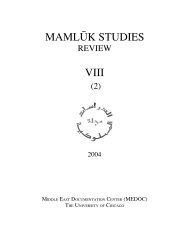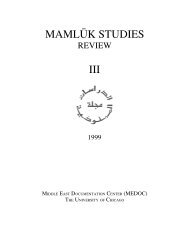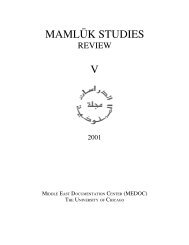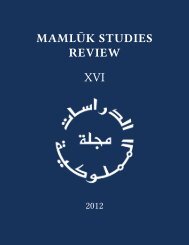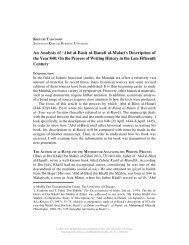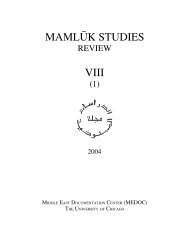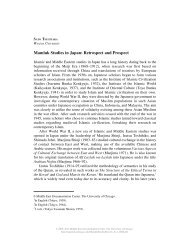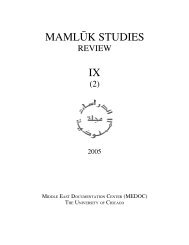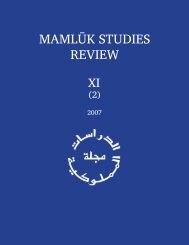Mamluk Studies Review Vol. VI (2002)
Mamluk Studies Review Vol. VI (2002)
Mamluk Studies Review Vol. VI (2002)
Create successful ePaper yourself
Turn your PDF publications into a flip-book with our unique Google optimized e-Paper software.
30 STEPHAN CONERMANN AND SUAD SAGHBINI, AWLA≠D AL-NA≠S AS FOUNDERS<br />
presented the evidence of witnesses, 44 the wa≠qif, who is classified as honorable, 45<br />
provides information about the size of the endowment. Above all, this includes a<br />
detailed description of the boundaries of the district of Yah˝yá's h˝issah, 46 whose<br />
precisely-assessed yields 47 were primarily intended to benefit his own relatives.<br />
According to the decree of a judge this was a regular waqf conforming to the<br />
shari‘ah, which could not be sold, transferred, given away, or exchanged. 48 The<br />
first part of the document closes with a commonly used quotation from the Quran<br />
by stating that the endowment conditions could not be altered until the day that<br />
God inherits "the earth and whoever is upon it" because He is "the best of heirs."<br />
(Quran 19:41 and 21:89). 49 It is only then that the real conditions of the deed are<br />
stated. The revenue accruing from the properties donated by Yah˝yá ibn T˛u≠gha≠n<br />
were to be paid out in decreasing proportions to his offspring, his sister, his<br />
half-sister, his mother, the surviving grandmother on his mother's side, and finally<br />
his wives and his stepmother. 50 Yah˝yá made especially elaborate provisions for his<br />
burial place. Quran readings were to be performed at that site every Friday, while<br />
recitals at his son's home were deemed sufficient on weekdays. 51 In accordance<br />
with common practice, revenues accruing from the endowed property were to be<br />
transferred in a descending line to the children and grandchildren of the donor and<br />
their offspring and to his near relatives. Should there be no surviving heirs, the<br />
revenues from the waqf passed to charitable institutions in the cities of Mecca and<br />
Medina, the holy places of Islam. 52 Yah˝yá ibn T˛u≠gha≠n reserved for himself the<br />
right to monitor the observance of the deed's provisions during his lifetime. 53<br />
Upon his death this responsibility was to be passed on to <strong>Mamluk</strong> amirs whom he<br />
mentioned by name as first, second, and third choices. The first amir was a certain<br />
Kumushbughá ibn ‘Abd Alla≠h al-Timra≠z|. 54 As fourth potential executor he<br />
appointed the chief eunuch of the sultan's palace (zima≠m al-a≠dur al-shar|fah), 55 an<br />
expert in administration, who would have ensured that the provisions of the<br />
44<br />
Ibid., line 4.<br />
45<br />
Ibid., lines 4–5.<br />
46<br />
Ibid., lines 10–11 and 16–17.<br />
47<br />
Ibid., lines 5–6 and 11–12.<br />
48<br />
Ibid., lines 20–21.<br />
49<br />
Ibid., lines 21–22.<br />
50<br />
Ibid., lines 24–29.<br />
51<br />
Ibid., lines 31–34.<br />
52<br />
Ibid., lines 35–48.<br />
53<br />
Ibid., lines 48–49.<br />
54<br />
Ibid., lines 51–53.<br />
55 Ibid., line 55.<br />
© <strong>2002</strong>, 2012 Middle East Documentation Center, The University of Chicago.<br />
http://mamluk.uchicago.edu/<strong>Mamluk</strong><strong>Studies</strong><strong>Review</strong>_<strong>VI</strong>_<strong>2002</strong>.pdf



